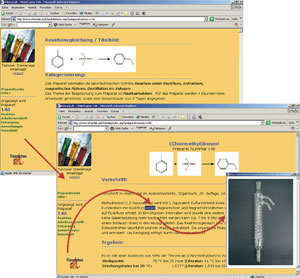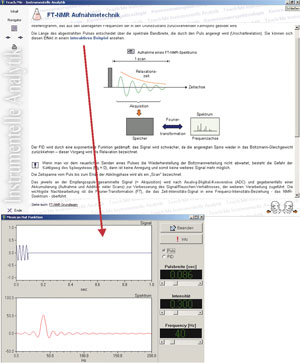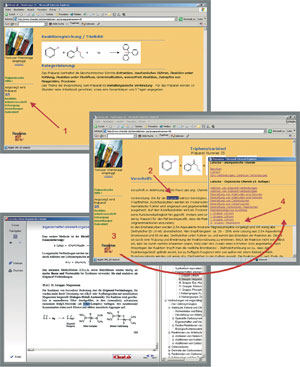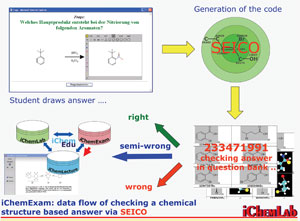iChemEdu -
the e-Learning concept of the Faculty of Technical Chemistry at the Vienna
University of Technology:
iChemLab - an Internet-based Information System for Synthetic Chemistry
Laboratory Courses - the e-content pool of iChemEdu
iChemExam - an internet based self-assessment tool within the iChemEdu concept
Synthetic laboratory courses ("wet chemistry") play an important role in
chemistry curricula. Experimental procedures and theoretical backgrounds
are mostly taken from printed literature, but have to be adapted to site
specific general conditions. Due to frequently changing supervising staff
information as well as knowledge about experienced practical problems get
regularly lost, therefore iChemEdu aimed at the development of an internet-based
laboratory information and management system, iChemLab, (in connection
with an e-content pool, iChemLecture, and an e-self-assessment tool, iChemExam)
to preserve knowledge and to maintain data, thus to supply a sustainable
solution.
The following paper supplies a comprehensive overview of the iChemEdu concept and its three main elements iChemLab, iChemLecture and iChemExam. The system - although fully integrated in the student's everyday lab business - is still under development and improvement. In particular, currently extension of functions and adoption to new software technologies are in progress. Moreover, interfaces for a tighter connection to the TU Wien students e-administration system TUWIS++ is in process of planning. Therefore a detailed description of such functionalities is postponed to a report at a later date.
Nevertheless, the current paper gives a widespread review of the iChemEdu philosophy, its broad scope and the rational behind.
The following paper supplies a comprehensive overview of the iChemEdu concept and its three main elements iChemLab, iChemLecture and iChemExam. The system - although fully integrated in the student's everyday lab business - is still under development and improvement. In particular, currently extension of functions and adoption to new software technologies are in progress. Moreover, interfaces for a tighter connection to the TU Wien students e-administration system TUWIS++ is in process of planning. Therefore a detailed description of such functionalities is postponed to a report at a later date.
Nevertheless, the current paper gives a widespread review of the iChemEdu philosophy, its broad scope and the rational behind.
For iChemLab a database application containing +450 detailed synthetic
experimental protocols has been developed by extracting and revising information
(procedures, chemical and physical data, literature, spectra, etc.) from
some 8600 student work reports collected over the last years (website:
http://www.ichemlab.at/; guest account: user: gast2; password: gast2, click
on the icon iChemLab).
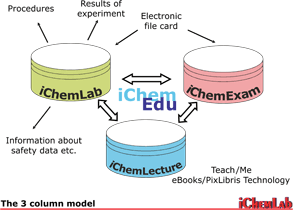
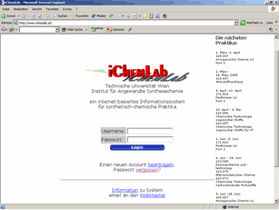
To supply students with the possibility of time- and location-independent
access to the system, iChemLab is designed as a web based application with
JAVA applets e.g. for the presentation and input of structural and spectroscopic
data. All acquired data is held in a MS SQL- Database-Server. So the student
has the option to prepare for the experiments / to submit obtained data
/ to write reports outside of (cost intensive) laboratory course hours
utilizing PCs in the lab, the e-learning room of the Faculty, public internet
rooms of the university or via private internet connection at home. The
supervising assistants are also supported in their now practically paperless
administration duties by iChemLab (e-file card, checking data online, ...)
and thus are able to focus on practical support of the students.
In addition to procedures, physicochemical data, literature etc. iChemLab
provides the student also with other information stored in various data
bases, such as material safety data sheets, waste disposal instructions,
spectra of target compounds displayed with a JAVA applet or photos of laboratory
equipment and glassware. The latter is depicted in the following screenshots:
after navigation to the procedure of the respective synthesis a (part of
a) term (e.g.: ... kühler) is highlighted followed by clicking on the flame
symbol. In the subsequently opening iChemThesaurus window amongst all entries
covering the appearance of the highlighted term in other procedures, e-books
etc. also a link to the iChemLab photo gallery is offered, which leads
- in the below given example - to the picture of a glass cooler.
The experiments, procedures and data stored in the web-accessible database
are regularly improved by the feed-back entered by students and assistants
during lab courses. Observed problems can immediately be announced and
improvements are made accessible to the colleagues via utilizing the system.
Since all results and data obtained are also recorded and stored (like
chemical yield, physical properties, NMR spectra, IR spectra and chromatographic
data etc.) the achievement of a single student, which is the basis for
marking, can now be objectively compared with the results of his/her colleagues
(and not, as practised before, exclusively with literature data and results,
which in many cases have been obtained under different laboratory conditions
or utilizing modified laboratory equipment and, above all, at not comparable
scale, what can be crucial with respect to chemical yields of the reactions
and purities of synthesized compounds).
Currently all synthetic chemistry courses in the first and second cycle
as well as some advanced preparative courses in the third cycle of the
study program "Technische Chemie" at the Vienna University of Technology
are run with iChemLab: the Foundations of Chemistry Lab (with special,
detailed support for freshmen), the Organic Chemistry Lab, the Inorganic
Chemistry Lab, the Macromolecular Chemistry Lab, the Solid State Chemistry
Lab, the Polymer Chemistry and Technology Lab and the Chemical Technology
of Renewable Resources Lab, to name but a few.
All chemistry students have to use iChemLab to complete their courses,
as their synthetic programs are listed on an electronic file card. They
obtain all relevant information for the syntheses to be accomplished from
the system, including above all the procedures as well as e.g. material
safety data sheets and hints for waste disposal. After having performed
the experiments the students have to enter relevant data and results into
iChemLab, which is required for a successful submission of their preparations.
In fact, everything - except submitting the synthesized compound to the
assistant - can be done paperless. For an optimum management of teacher's
and student's tasks the system iChemLab offers different user access adapted
to the needs of assistants and students (for assistants: e.g. marking,
checking results, comparing submitted data with those of former experiments;
for students: e.g. electronic order of required chemicals from the chemical
stock room, estimated personal working time required for hands-on activities
vs. total reaction time, which also includes blocking times of equipment
- as a help and guidance for better planning parallel experiments and thus
the lab time management).
iChemLecture as a second part of the iChemEdu concept is an "e-collection"
of textbooks and content for chemists (see: http://ebooks.tuwien.ac.at/)
produced from e.g. printed material / text books as so called "e-copies",
via scanning / optical character recognition (using the specially developed
PixLibris technology: http://www.pixlibris.com/), full text indexing and
hyper-linking or made available by creating specific e-books (e.g.: the
Teach/ Me products: http://teachme.tuwien.ac.at/) with an appropriate authoring
system (Coimbra: http://www.coimbra.at/). All e-content integrated into
iChemLecture is based on software technologies developed by Hans Lohninger,
Institute of Chemical Technologies and Analytics.
Subsequently two examples are presented.
The e-book "Teach/Me Instrumentelle Analytik" (http://teachme.tuwien.ac.at/tmanalytik/)
was developed at the TU Wien, integrated into the iChemLecture pool of
iChemEdu and is also commercially available (H. Lohninger, J. Fröhlich,
B. Mizaikoff, E. Rosenberg: Teach/Me Instrumentelle Analytik, Springer,
Heidelberg, 2003, ISBN 3-540-14957-0). It is an HTML based product with
embedded interactive simulations, produced with Coimbra and covers a broad
range of instrumental analytical methods: vibration spectroscopy (IR, UV-VIS),
chromatography (LC, GLC, TLC), mass spectroscopy and nuclear magnetic resonance
spectroscopy, thus supporting the students in structure elucidation and
confirmation of their synthesized products.
In particular the interactive examples in Teach/Me represent an added value
which only can be provided by e-book technology. Students can "use" analytical
instruments online, they simulate measurements or chromatographic separations,
they study the impact of changed parameters on the experiment or e.g. view
the excitation profile of a high frequency pulse in nmr spectroscopy, as
depicted in the presented screen shots.
Another set of e-content is represented by "e-copies": printed books are
scanned as pictures and subjected to OCR. Pictures and the generated ASCII
text are stored in a database. Relevant metainformation (e.g. title, indexes,
key words, related topis) is added and all together is organized as an
e-book with Coimbra. The user interface works in a sense that always the
scanned pages are displayed (improved with antialiasing features for high
quality zooming applying the "Pixlibris" technology), but navigating in
the book is controlled by the background metainformation. Additionally,
hyperlinks for cross-referencing complete the conversion of a printed book
to a hypertext book. Within the project three textbooks have been processed
and added to iChemLecture pool (H.P. Latscha, U. Kazmaier, H.A. Klein:
Organische Chemie, Springer, Heidelberg, 2004; H.P. Latscha, H.A. Klein:
Anorganische Chemie, Springer, Heidelberg, 2002; H.P. Latscha, G. Linti,
H.A. Klein: Analytische Chemie, Springer, Heidelberg, 2002).
Via a special arrangement of H. Lohninger with Springer the free use for
students of the Faculty of Technical Chemistry via a renewable e-licence
for each one year could be negotiated.
iChemLab and iChemLecture are connected bidirectionally via iChemThesaurus
as an interface. Thus a student can be directly led from a procedure /
a synthetic protocol of her/his course program in iChemLab into iChemLecture
to a page of an e-copy providing relevant learning content.
This iChemLab/iChemLecture link is documented by the following example:
the student navigates to the experimental details of a procedure in the
assigned lab program (1). If due to lack of knowledge more details about
e.g. the Grignard reaction are required, the word "Grignard" in the text
is highlighted (2), followed by a click on the flame symbol (3), which
then opens the iChemThesaurus window displaying a list of all appearances
of the term "Grignard" in the iChemLab databases. Also the indexes of all
available e-books/e-copies are automatically scanned for the transferred
keyword and a choice of all relevant links to pages/chapters in the presently
installed e-content in the iChemLecture pool is displayed in the iChemThesaurus
window, too. Clicking (4) on the most suitable topic in the list (in this
case the chapter "Magnesium" in an e-copy of an Organic Chemistry text
book fits perfectly) directly transfers the user to iChemLecture, where
via the Coimbra Active Server the e-copy of the relevant text book is automatically
opened and the target page of the text book is displayed to supply the
student with appropriate learning information.
The third corner stone of the "e-information triangle" iChemEdu is iChemExam,
a self assessment area to check the knowledge required for performing the
experiments. Besides the most common answering methods such as multiple
choice selections and checks for numeric values, we also have developed
- as an innovation to e-assessment in chemistry - new tools to answer and
proof questions via input of chemical structures (e.g. to answer organic
synthetic questions or structural problems). The supplied answer-structures
are screened for correctness via a special tool, based on a newly developed
algorithm coined SEICO (Spherical Environment based Integer COde): chemical
structures are encoded via hash code as integers, even stereochemical features
such as R/S or E/Z are clearly differentiated. This integer-based technique
in particular allows smooth integration into web- based assessment technology.
Added value is given by supplying didactic hints in the case of learning
deficits and/or "semi-wrong" answers, thus offering - through direct linking
via iChemThesaurus into appropriate chemical e-content of iChemLecture
- learning aids for the students to brush up knowledge, utilizing the same
technology as presented in the example of the iChemLab/ iChemLecture interface
above.
The demo website of iChemExam is accessible via the link http://www.ichemlab.at/ichemexam/
Summary
iChemEdu is a hypertext system that interconnects iChemLab, iChem Exam
and iChemLecture via bi-directional software interfaces, which enable direct
linking / input of queries from one area into the other as well as to further
(external) databases. Experimental procedures contain JAVA script supported
links to thesauri supplying extended information like theoretical background
of the desired reaction, applicable labware, safety data, information about
waste disposal etc.
Additionally the experiments to be performed by the students have been
thoroughly analysed with respect to student working time for different
steps/operations and stored in the system. Thus better and realistic workload
data for the assignment of ECTS credits can be provided. As a result timely
well-balanced laboratory programs for each student can be generated by
electronic support with iChemLab.
iChemEdu has a modular architecture to enable in the future smooth integration
of additional lab courses (covering in addition to synthetic chemistry
also e.g. analytical or physical chemistry), new information categories,
tools and content. It has been developed over a period of three years by
a consortium of chemistry institutes at the Vienna University of Technology
and the Technical University Graz within a project granted by the Austrian
Federal Ministry for Education, Science and Culture (1st project call:
"NML-1: Neue Medien in der Lehre an Universitäten und Fachhochschulen";
iChemLab is one out of 13 supported projects, selected in a two phase peer-review
process from approx. 120 applications; financial support: Euro 213.000 for
personnel; additional hardware grant: approx. Euro 36.000; guidance of the
project: TU Wien; software development: H. Krebs; project coordinator:
J. Fröhlich).
The system is now fully integrated in everyday practical chemistry teaching
and thus utilized by all chemistry students. Support is provided by the
Faculty of Technical Chemistry which guarantees sustainability of the implemented
e-learning strategy and technologies. Maintenance and further development
/ extensions to the system are performed by the iChemEdu IT staff consisting
of three key persons for software development, hardware/system support
and content production / management, who have been employed at the faculty
after ending of the project funding period not to loose the acquired expertise.
One of the future main goals, apart from further development and integrating
new application areas into iChemEdu, is to link such discipline-specific
with centrally developed e-resources (e.g. student and lecture/course administration)
for creating optimum synergistic and complementary solutions.
As a consequence also need for an overarching e-learning platform will
be given in the future, preferably an open source product with high flexibility,
versatility and the potential for the development of hand-tailored add-on
modules for interfacing with pre-existing know-how and implemented TU e-learning
applications.
This will be one of the important challenges and objectives in the future
for a taskforce incorporating representatives of already present e-learning
activities, the ADV/ZID and IT-specialists of the faculties under the coordination
of the advisory board of the TU Wien e- learning centre, which has a pivotal
position in conceiving the e-learning strategy of the TU Wien. This also
requires allocation of appropriate budget for its continuous implementation.
In this context there are good latest news available: an application of
the project DELTA-3 submitted by a consortium of TU Wien, Universität für
Bodenkultur and Akademie für Bildende Künste (under the guidance of the
TU Wien) at the recent call "NML-3: Entwicklung und Umsetzung von e-Learning/e-Teaching-Strategien
an Universitäten und Fachhochschulen" (within the initiative "Neue Medien
in der Lehre" of the bm:bwk; http://www.nml.at/; http://strategie.nml.at/)
was granted after a peer-review process.
Details will be reported in due course after completion of the contract
negotiations with the bm:bwk.
